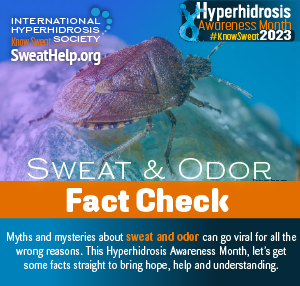


Fact Check: Sweat & Odor
Can you really sweat out toxins? Does sweat really stink?
This Hyperhidrosis Awareness Month, We’re Busting Myths, Misconceptions and Misinformation
We work to raise awareness of the medical condition hyperhidrosis (uncontrollable, excessive sweating), its impacts, diagnosis and treatment all the time - but during November’s Hyperhidrosis Awareness Month we ramp up our efforts with your support!
This year, we’re busting common sweat and hyperhidrosis myths, misconceptions and misinformation. You can help by sharing this info on your channels!
Myth - Sweat stinks Actually, it doesn’t.
Sweat is naturally almost entirely odorless. It’s only when sweat comes in contact with microorganisms, like bacteria, on our skin that body odor erupts. As bacteria metabolize certain components of sweat (proteins and lipids), by-products with unpleasant odors are released.
Areas, where we have more hair and moisture (like in our armpits and groins), tend to generate more body odor because they are home to more dampness-loving microorganisms.
To fight body odor:
If odor continues to be a problem, talk to a knowledgeable healthcare provider. Treatment options that tackle unwanted sweating also fight body odor.
Misconception - We sweat out toxins
Physiologically, no; humans sweat to cool ourselves, not to clear toxins. Sweat is made up of 99% water, mixed with a bit of salt, carbohydrates, protein, and some urea (a nontoxic compound made by the liver). While tiny amounts of pollutants might make their way out of the body through sweat, your true toxin-removing workhorses are your kidneys and liver, which filter blood, metabolize medications and convert toxins into waste materials.
Of course, sweating heavily and purposefully with exercise or while sitting in a sauna or a sweat lodge has long been culturally valued for healing and spiritual benefits. If this is something that connects you to community or your heritage, is part of a cleansing or ritual, or brings you other physical or emotional effects, that is recognized and respected. To stay safe, consult a healthcare provider prior to exposing yourself to prolonged, high temperatures and prepare to do so appropriately according to your elders’, organizers’ or group’s guidance.
Misinformation - The only way to fight sweat is with antiperspirants
Antiperspirants do play a key role in combating unwanted sweating and you can use them on body parts beyond the underarms. But there are plenty of other options, too.
Actually there are about seven more treatments available and many additional ones are in development. From prescription wipes to Botox injections to an in-office 3-minute patch or permanent microwave thermolysis of sweat glands, from oral medicines to at-home iontophoresis, there are now a lot of choices to treat sweat! Learn about them all.
Fact - Excessive sweating is a treatable skin disease
Hyperhidrosis affects nearly 5% of people. It’s a real and recognized medical condition that causes people to sweat 4 or 5 times more than normal. It can disrupt all aspects of a person's life, from career choices and recreational activities to relationships, emotional well-being and self-image. But there is help, support and effective treatment.
Explore our website further to learn more and find a knowledgeable clinician. Stay tuned all month for more myth-busting and actionable information for a sweat-savvy life.
Huge thank you to our individual donors, miraDry Inc. and Candesant Biomedical for supporting the International Hyperhidrosis Society and 2023 #HyperhidrosisAwarenessMonth!
Get involved on:
Facebook @SweatingStopsHere
Twitter (X) @WeKnowSweat and
Instagram @WeKnowSweat
#KnowSweat #KnowSweat2023
Latest Blogs